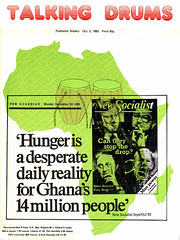Mirage Of One-Party System In Nigeria
by Ben Mensah
Again if the outcome of the elections is a spectre of one party system in the country following the massive victory of President Shehu Shagari's National Party of Nigeria (NPN) then any other form of government in Africa either military or one party dictatorships is justifiable.
These two messages from the elections would have presaged doom to the fortunes of multi-party based parliamentary democracy in Africa but for the following reasons.
Nigeria is regulated by a properly drawn up constitution which defines the roles of farmers, soldiers, politicians, journalists etc in the society and no wonder the judges have had a busy time adjudicating over election petitions. Not all their verdicts have been popular but, at least, some of them deserve commendation.
In Anambra, the election tribunal were not intimidated by incumbent Governor Nwobodo's threats and refusal to vacate the government house, nor were they overawed by the authority and influence of President Shagari whose NPN candidate had been declared winner by FEDECO.
Their verdict which overturned the FEDECO result in favour of Governor Nwobodo of the NPP was handed down from the ability and integrity of the judges.
In Ondo a similar puzzle of rejecting Fedeco results in favour of NPN candidate Chief Akin Omoboriowo and returning the incumbent Governor Chief Ajasin was done to the best intentions and ability of the judges. In Oyo the Fedeco results were endorsed by the tribunal and the incumbent Governor Bola Ige of the UPN lost the state to NPN's Dr. Omololu Olunloyo.
Nor were the three states the only ones where the courts had election petitions to deal with. In Borno state Alhaji Mohamed Abba Gana of the GNPP lost his challenge against the election of Alhaji Asheik Jarmar as Governor-elect. In Imo state, Chief Collins Obi also lost his petition against the re-election of Governor Sam Mbakwe.
The flood of these petitions cast a shadow of doubt and despair over the conduct and objective of the elections.
But what is the alternative system to it? Coups d'etat staged by the military on behalf of opposition civilians in which blood is shed or one party dictatorships in which the electorate are offered the opportunity to change personalities but not policies!
In an open letter to President Shagari, Dr. Nnamdi Azikiwe who is generally regarded as the father of Nigerian nationalism and Presidential candidate of the Nigerian Peoples Party (NPP) warned that the country was on the brink of dictatorship as a result of electoral malpractices.
He described the election as a breach of democracy and a mockery of the concept of free and fair elections.
In conclusion Dr. Azikiwe lamented, "as one patriot who struggled alongside other compatriots to make Nigeria free, I see my country on the brink of dictatorship because of the arrogance of power exhibited by the party in power throughout the election exercise."
The NPN, despite its overwhelming majority in both houses of the National Assembly and also control of eleven out of nineteen states has dismissed fears of one party dictatorship a hallucinatory but the opposition parties are not convinced.
President Shagari has stated his abhorrence of a one party state and one hopes that he resists pressure from sycophantic sources to amend the constitution to enable him to circumvent the constitutional prohibition of a third term for him.
With Shagari off the scene in 1987 to be replaced by a candidate outside the northern constituency of President Shagari, under the 'Zoning system' will the four states of Chief Awolowo's Unity Party and three states of Azikiwe's Northern Peoples Party, all in the south fall behind a southern candidate and make the NPN's dominance a 'fait accompli'?.
It is the view of this writer that a southern-led NPN will lose some of its support in the north to a party like the PRP whose support base in Kano state has not in any way been eroded by President Shagari's stature.
In effect, it will lead to a virile and rejuvenated Peoples' Redemption Party drawing its support from Northern solidarity, while parties like the UPN and particularly NPP will succumb to an NPN which is likely to be inspired by Colonel Ojukwu and other southern personalities.
Hence while the spectre of a one party system is a far fetched possibility in a culturally and ethnically diversified society like Nigeria which also has a dynamic press, the onus will be on President Shagari and his party. between now and 1987, not to play any funny tricks on the Nigerian people by exploiting their strong position to amend the constitutional provision that guarantees a multi party system and also ensures only a two term presidency for one man.
For it is only when the constitution is respected will Nigerians continue to set examples for the rest of Africa and also be spared the other alternatives to parliamentary democracy, military coups or one party dictatorships.

